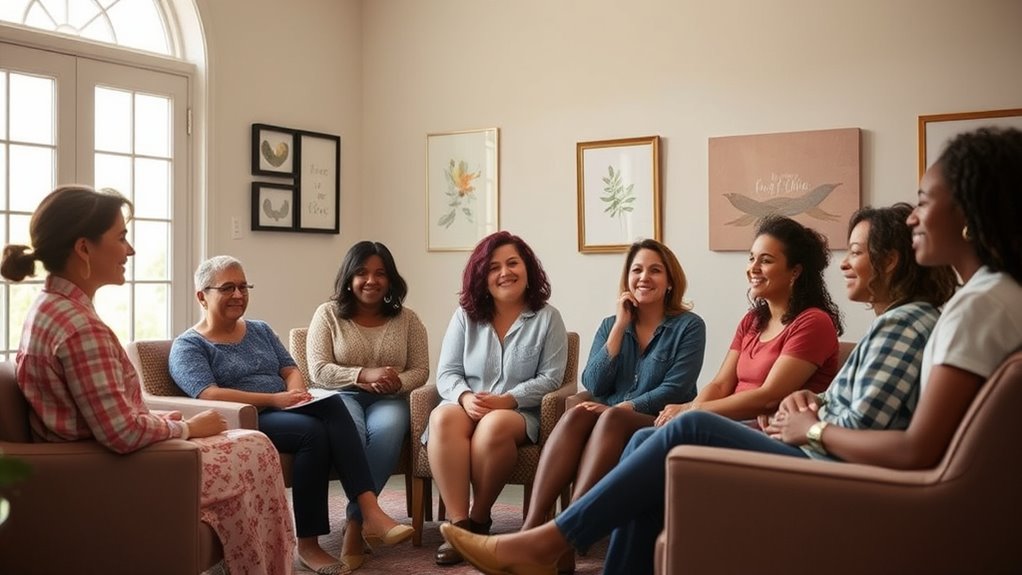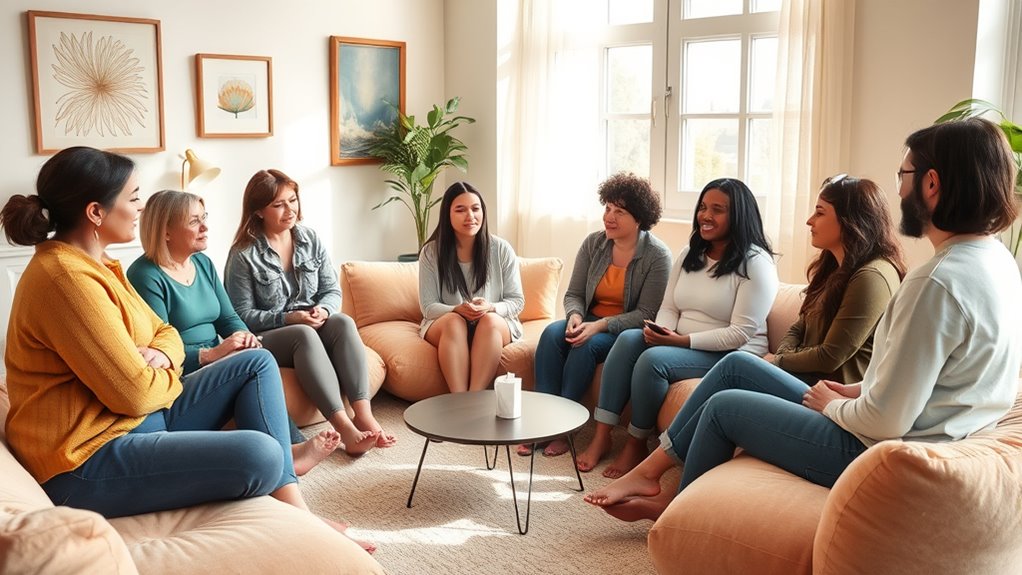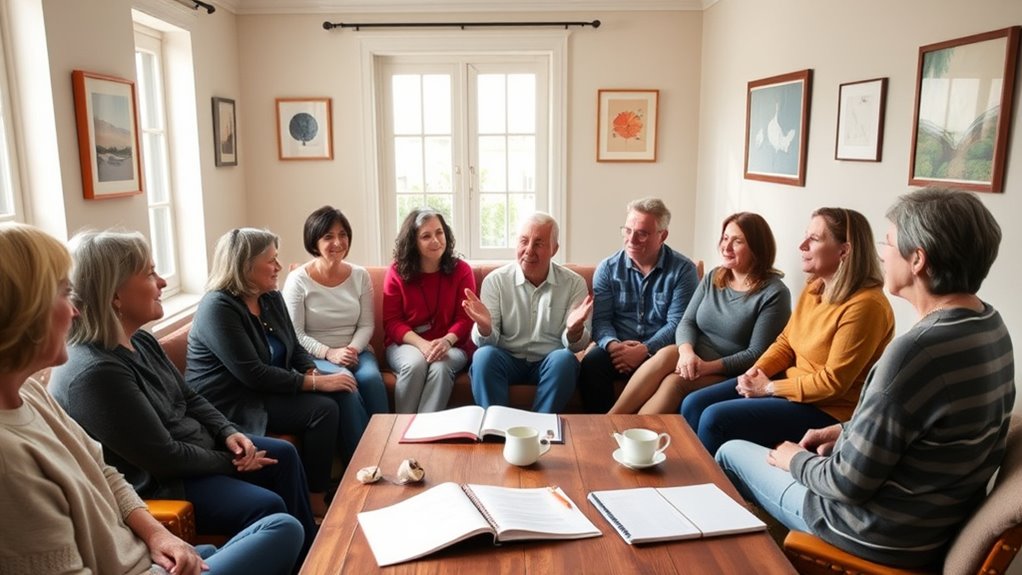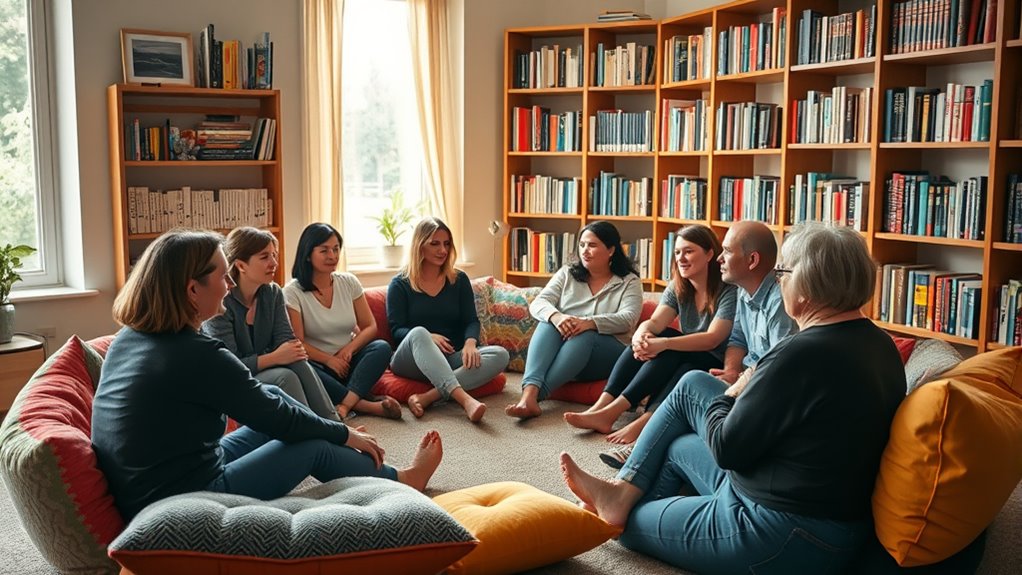Support groups for BPD in Houston, TX offer both online and in-person options focused on emotional regulation, recovery, and social skills. These groups often include peer-led meetings or professional therapy sessions, emphasizing evidence-based methods like DBT. They create a safe space where you can share experiences, feel validated, and learn practical coping strategies. Participating can boost self-esteem, reduce conflicts, and complement your therapy. Keep exploring to discover how these groups can best support your journey.
Key Takeaways
- Offer both online and in-person meetings focused on emotional regulation, recovery, and social skills for BPD.
- Include peer-led and professionally facilitated groups using evidence-based approaches like DBT.
- Provide culturally sensitive support in languages such as Spanish, Farsi, and Bulgarian.
- Help reduce isolation, improve self-esteem, and teach practical coping strategies through shared experiences.
- Serve as a valuable supplement to therapy, reinforcing skills and fostering community for ongoing support.
Types of Support Groups Available in Houston, TX

Houston, TX offers a diverse range of support groups for individuals with BPD, catering to various needs and preferences. You can find both online and in-person support groups focused on emotional regulation, recovery, and social skills development. These groups include peer-led meetings and professionally facilitated therapy sessions, providing a supportive environment to share experiences and learn coping strategies. Many groups also emphasize evidence-based approaches to ensure effective management of BPD symptoms, which are critical for effective treatment and long-term support. Incorporating therapeutic techniques such as dialectical behavior therapy (DBT) can enhance the effectiveness of these groups. Houston’s community also offers culturally sensitive groups that speak languages like Spanish, Farsi, and Bulgarian, ensuring inclusivity for diverse backgrounds. Support options range from short-term, themed groups to ongoing peer support meetings, typically lasting around 75 minutes. Additionally, some organizations partner with mental health professionals to provide professional guidance during group sessions, ensuring participants receive accurate information and support. Creating a supportive environment is fundamental for encouraging open dialogue and fostering trust among members. Whether you’re seeking targeted therapy or peer-led encouragement, Houston’s support groups create accessible pathways to understanding and managing BPD.
Benefits of Participating in BPD Support Groups

Have you ever wondered how participating in BPD support groups can positively impact your well-being? Support groups offer a safe space where you can share your experiences and feel understood through shared experience. Peer validation boosts your self-esteem and helps foster a sense of community. Engaging in BPD support provides practical coping strategies and emotional regulation techniques directly from people who truly understand your challenges. Regular participation can reduce feelings of emotional dysregulation, decrease emotional dysregulation, and lessen impulsivity and relationship conflicts. These groups serve as a crucial supplement to therapy, promoting personal growth, hope, and accountability. Additionally, understanding Relationships – Personality Test can offer a comforting escape and inspiration during challenging times. Utilizing professional voice actors in educational or promotional materials for these groups can enhance credibility and engagement.
How Support Groups Complement Professional Treatment

Support groups naturally complement professional treatment by providing ongoing emotional validation and peer understanding that reinforce the skills you learn in therapy. Through peer support, you gain a safe space to share experiences and practice interpersonal skills, which can accelerate your progress. Engaging with dog names in a supportive environment can also foster a sense of community and comfort, similar to how support groups work for mental health. These groups act as valuable BPD resources, offering community support that reduces feelings of isolation and stigma. When combined with group therapy and professional treatment like DBT, support groups enhance mental health outcomes by reinforcing coping strategies and emotional regulation techniques. They serve as accessible extensions of your treatment plan, helping you stay engaged and motivated. Overall, community support through these groups strengthens your recovery, making your journey toward stability more sustainable and empowering. Additionally, participating in peer-led initiatives can further deepen your understanding and resilience in managing BPD. Incorporating Cultural Intelligence strategies, such as understanding diverse perspectives within the group, can improve communication and foster inclusivity. Developing emotional resilience through shared experiences can also bolster your capacity to handle challenges during recovery. Engaging in spiritual practices, such as meditation or prayer, can also bolster emotional resilience and foster inner peace during recovery.
Finding and Joining BPD Support Communities Online

Finding the right online support communities can substantially enhance your journey with BPD by connecting you with others who understand your experiences. BPD support groups, available through online communities, offer peer support and shared lived experience, giving you emotional validation and a sense of safety. Many organizations facilitate free, moderated virtual meetings via platforms like Zoom, often requiring prior registration. These groups meet weekly or bi-weekly, providing a space to discuss treatment options, develop coping skills, and learn from others’ journeys. Understanding narcissistic behaviors can also help you recognize potential manipulation or emotional abuse within your support network, ensuring your safety and well-being. Recognizing risk management strategies can help you navigate group dynamics and maintain your mental health while participating in these communities. Digital tools like DBT Coach apps also support skill development and symptom management, which can complement your participation in these communities. Engaging with mental health resources can further strengthen your support system and provide additional coping strategies.
Resources and Books to Support Your Journey With BPD

Exploring books and resources tailored to BPD can profoundly strengthen your understanding and coping strategies. Support groups and peer support provide invaluable shared lived experience, helping you feel less alone.
Resources for BPD, including books on BPD like *Loving Someone with BPD* and *The High Conflict Couple*, offer practical insights into emotional regulation, relationship dynamics, and effective communication. These materials emphasize self-care and boundary-setting, which are essential for maintaining your well-being. Recognizing soulmate angel numbers can also provide comfort and guidance during challenging times, fostering hope and resilience in your journey. Developing creative resilience can further empower you to navigate emotional ups and downs with greater adaptability.
Family support guides can help loved ones better understand and assist you. When used alongside therapy, these resources empower you to build resilience, foster healthier interactions, and navigate your journey with confidence.
Frequently Asked Questions
What Are the 3 C’s of BPD?
You’re asking about the 3 C’s of BPD. These represent key emotional states you might experience: Crisis, which brings intense distress and impulsive actions; Chaos, reflecting emotional turbulence and unstable relationships; and Control, the struggle to manage overwhelming feelings, either by trying to dominate or feeling helpless.
Recognizing these 3 C’s helps you identify warning signs and develop coping strategies, making it easier to navigate your emotions.
Does Untreated BPD Get Worse With Age?
Yes, untreated BPD tends to get worse with age. Without intervention, your emotional instability and impulsivity can intensify, making it harder to manage relationships and daily life.
Over time, symptoms may become more entrenched and difficult to treat, and you’re at higher risk for developing or worsening comorbid conditions like depression or substance abuse.
Early treatment is key to preventing these negative outcomes and improving your overall well-being.
What Is Group Therapy for Borderline Personality Disorder?
Think of group therapy for BPD as a safe harbor in a stormy sea. You share your struggles, learn new coping tools, and connect with others steering similar waters.
With guidance from a trained therapist, you build emotional resilience and interpersonal skills, reducing feelings of isolation.
This supportive environment helps you chart a course toward recovery, fostering personal growth and restoring your sense of stability amid life’s turbulence.
Can a Person With BPD Live Alone?
You can live alone with BPD if you develop strong coping skills and stability. It’s possible to manage your emotions and impulses independently, but it requires self-awareness and good support systems.
Living alone might reduce conflicts and triggers, yet loneliness or feelings of abandonment can be challenges.
Ultimately, whether you can live alone depends on your ability to manage symptoms and maintain daily functioning effectively.
Conclusion
Joining a support group can make a real difference in your journey with BPD. Studies show that 70% of participants experience improved coping skills and reduced feelings of isolation. By connecting with others who understand what you’re going through, you gain strength and encouragement. Remember, you’re not alone in this. With the right support and resources, you can navigate BPD more confidently and find hope in your path to healing.









